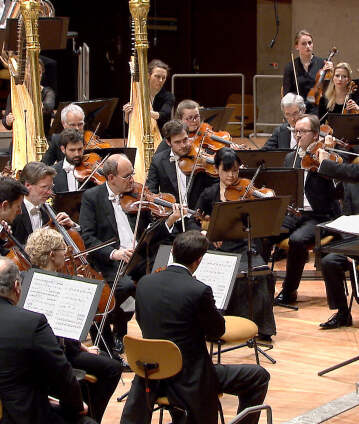Iván Fischer conducts Mahler’s Symphony No. 3

Mahler’s Third Symphony is a gigantic work in every respect. Firstly, in terms of length – just the opening movement is longer than Beethoven’s Fifth Symphony. Most notably, however, Mahler creates here a cosmos of the most diverse expressive worlds. Iván Fischer leads us into this cosmos in this concert with mezzo-soprano Anna Larsson; his recording of all the Mahler symphonies has been showered with prizes.
“Now just imagine a work so grand that the whole world is actually reflected therein – so that one is, so to speak, only an instrument upon which the universe plays,” Gustav Mahler wrote in the summer of 1896 to his lover, the soprano Anna von Mildenburg. The composer was spending the holidays in the Austrian town of Steinbach am Attersee to work on his new symphony, the Third, free of his commitments as conductor. With this work, which has six rather than the usual four movements, Mahler went beyond the scope of all that preceded him, exceeding the Second Symphony by about 15 minutes – a piece whose duration was already of extensive length, with a playing time of about 90 minutes. The first movement alone lasts more than half an hour. Brusque, garish, advancing in an unrelenting march tempo, it pulls the listeners into an unsettling world. Mahler develops a musical universe, a cabinet of curiosities of life and nature, so to speak, from the raw, from below. Mahler originally gave each movement a programmatic title. He later dispensed with the names, but the “inner programme” remained nonetheless.
Mahler forges together the sublime and the vulgar: echoes of military and funfair music, grotesque humour and folksy cheeriness are found next to profound desperation and mystical transcendency. In the fourth movement there is an alto solo on the words of the poem “O Mensch! Gib acht!” from Friedrich Nietzsche’s Also sprach Zarathustra; the fifth movement is a choral movement in which Mahler has set the song “Es sungen drei Engel” from Des Knaben Wunderhorn to music. New as well: the symphony ends not with a fast movement, but with a hymnal Adagio. Incidentally: the first complete performance of the Third Symphony with the Berliner Philharmoniker took place in January 1907 conducted by Gustav Mahler. Since then, the orchestra has performed this work with many renowned conductors. The Hungarian Iván Fischer, a guest conductor with the Berliner Philharmoniker since 1989, presents himself here for the first time in the framework of Philharmoniker orchestral concerts as a Mahler interpreter.
© 2016 Berlin Phil Media GmbH
Related interviews